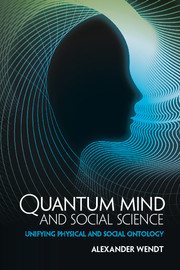Book contents
- Frontmatter
- Dedication
- Epigraph
- Contents
- Acknowledgments
- 1 Preface to a quantum social science
- Part I Quantum theory and its interpretation
- Part II Quantum consciousness and life
- Part III A quantum model of man
- Part IV Language, light, and other minds
- Part V The agent-structure problem redux
- Conclusion
- Bibliography
- Index
Part V - The agent-structure problem redux
Published online by Cambridge University Press: 05 May 2015
- Frontmatter
- Dedication
- Epigraph
- Contents
- Acknowledgments
- 1 Preface to a quantum social science
- Part I Quantum theory and its interpretation
- Part II Quantum consciousness and life
- Part III A quantum model of man
- Part IV Language, light, and other minds
- Part V The agent-structure problem redux
- Conclusion
- Bibliography
- Index
Summary
Introduction
The problem of how to understand language and its relationship to speakers is an instance of the more general problem of how to understand the relationship between social structures and agents. Languages per se do not constitute social structures – one needs particular forms of language, such as discourses about “capitalism” or “marriage,” to do that – but they make such social structures possible in the first place. In this Part, I push closer to such discourses by re-considering, from a quantum perspective, the ontology of social structures and their relationship to agents in general.
The agent–structure problem is concerned with understanding the relationship between intentional agents and the structured social systems or societies in which they are embedded. Typically the agents in question are assumed to be individuals, but in some disciplines, notably IR, they are corporate or group-level phenomena like the state, to which scholars often attribute agentic properties. Since I have already discussed at length how individual agents should be conceptualized in quantum terms (Part III), it makes sense to retain that focus on individuals as I attend to the concept of social structure here, although in Chapter 14 I take up the question of state agency as a way of illustrating the potential purchase of my approach for my own field of IR.
In the social sciences the concept of social structure is defined in a bewildering variety of ways. What precisely a quantum view of structure entails will become clearer below; first, following Anthony Giddens, I want to distinguish it from the concept of social system (or society). The latter refers to behavioral regularities that our ET friends might discover simply by looking through their surveillance cameras. Social ‘structure,’ in contrast, refers to mind-dependent, relatively enduring relationships that explain those regularities. As such, to speak of the agent–structure rather than –system (or –society) problem is to highlight (unobservable) cause (sic) rather than (observable) effect.
Information
- Type
- Chapter
- Information
- Quantum Mind and Social ScienceUnifying Physical and Social Ontology, pp. 243 - 246Publisher: Cambridge University PressPrint publication year: 2015
